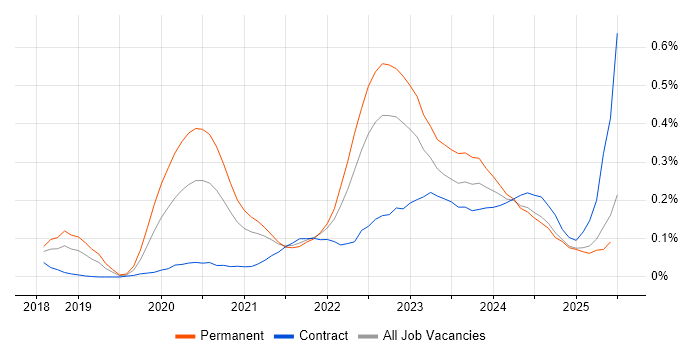Low-Code
England > South West
The table below looks at the prevalence of the term Low-Code in permanent job vacancies in the South West. Included is a benchmarking guide to the salaries offered in vacancies that cited Low-Code over the 6 months leading up to 8 January 2026, comparing them to the same period in the previous two years.
| 6 months to 8 Jan 2026 |
Same period 2025 | Same period 2024 | |
|---|---|---|---|
| Rank | 174 | 182 | 198 |
| Rank change year-on-year | +8 | +16 | +32 |
| Permanent jobs citing Low-Code | 5 | 6 | 17 |
| As % of all permanent jobs in the South West | 0.099% | 0.14% | 0.37% |
| As % of the Miscellaneous category | 0.39% | 0.37% | 1.05% |
| Number of salaries quoted | 5 | 3 | 13 |
| 10th Percentile | £38,475 | - | £32,790 |
| 25th Percentile | £41,250 | £31,250 | £33,448 |
| Median annual salary (50th Percentile) | £47,500 | £32,500 | £40,000 |
| Median % change year-on-year | +46.15% | -18.75% | -3.03% |
| 75th Percentile | £117,500 | £34,000 | £48,750 |
| 90th Percentile | - | £34,150 | £57,000 |
| England median annual salary | £65,000 | £71,250 | £65,000 |
| % change year-on-year | -8.77% | +9.62% | +18.18% |
All Generic Skills
South West
Low-Code falls under the General and Transferable Skills category. For comparison with the information above, the following table provides summary statistics for all permanent job vacancies requiring generic IT skills in the South West.
| Permanent vacancies with a requirement for generic IT skills | 1,280 | 1,619 | 1,624 |
| As % of all permanent jobs advertised in the South West | 25.27% | 38.01% | 35.27% |
| Number of salaries quoted | 828 | 786 | 1,196 |
| 10th Percentile | £27,000 | £10,258 | £29,440 |
| 25th Percentile | £31,219 | £34,404 | £37,500 |
| Median annual salary (50th Percentile) | £45,000 | £50,000 | £53,125 |
| Median % change year-on-year | -10.00% | -5.88% | +1.19% |
| 75th Percentile | £60,000 | £65,000 | £68,750 |
| 90th Percentile | £73,750 | £81,875 | £84,056 |
| England median annual salary | £55,000 | £60,000 | £60,000 |
| % change year-on-year | -8.33% | - | -7.69% |
Low-Code
Job Vacancy Trend in the South West
Historical trend showing the proportion of permanent IT job postings citing Low-Code relative to all permanent IT jobs advertised in the South West.

Low-Code
Salary Trend in the South West
Salary distribution trend for jobs in the South West citing Low-Code.

Low-Code
Salary Histogram in the South West
Salary distribution for jobs citing Low-Code in the South West over the 6 months to 8 January 2026.
Low-Code
Job Locations in the South West
The table below looks at the demand and provides a guide to the median salaries quoted in IT jobs citing Low-Code within the South West region over the 6 months to 8 January 2026. The 'Rank Change' column provides an indication of the change in demand within each location based on the same 6 month period last year.
| Location | Rank Change on Same Period Last Year |
Matching Permanent IT Job Ads |
Median Salary Past 6 Months |
Median Salary % Change on Same Period Last Year |
Live Jobs |
|---|---|---|---|---|---|
| Devon | - | 2 | £42,875 | - | 5 |
| Somerset | -16 | 1 | £47,500 | +43.94% | 3 |
| Low-Code England |
|||||
Low-Code
Co-Occurring Skills & Capabilities in the South West by Category
The following tables expand on the one above by listing co-occurrences grouped by category. They cover the same employment type, locality and period, with up to 20 co-occurrences shown in each category:
